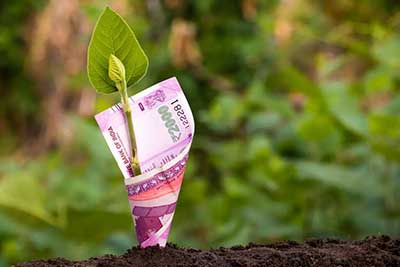Date: 17/04/2023
Relevance: GS-3: Conservation, Environmental Pollution, and Degradation, Environmental Impact Assessment.
Key Phrases: green deposit framework, environmentally sustainable practices, interest-bearing instrument, climate risk mitigation, climate adaptation and resilience, mandatory third-party verification, Reserve Bank of India (RBI).
Why in News?
- Recognising that climate change is one of the most critical challenges in the present era, the Reserve Bank of India (RBI) has issued a framework for banks to accept and promote green deposits.
What are green deposits?
- As the name goes, deposits raised under this banner should be deployed towards projects earmarked for green financing.
- A green deposit is an interest-bearing instrument received by banks for a fixed period, the proceeds of which are earmarked for green-financing, such as funding renewable energy projects.
- Green financing is lending to or investing in projects which contribute towards climate risk mitigation, climate adaptation and resilience, and other climate-related or environmental objectives including biodiversity management and nature-based solutions.
The green deposit framework:
- As per the RBI framework, banks will offer the deposits as cumulative/ non-cumulative deposits.
- On maturity, the green deposits would be renewed or withdrawn at the choice of the depositor.
- The green deposits shall be denominated in rupees only.
- Banks and NBFCs shall put in place a comprehensive board-approved policy on green deposits, laying down all aspects in detail for the issuance and allocation of green deposits and a copy of the policy on ‘green deposits’ shall also be made available on their websites.
Who can accept green deposits?
- The framework applies to all scheduled commercial banks and small finance banks (except for regional rural banks and local area banks) and non-banking finance companies (including housing finance companies).
- Both corporate and individual customers can invest in green deposits.
How are they different from normal deposits?
- The primary difference between green deposits and regular deposits is the deployment of the funds.
- While regular deposits go into a common deployment pool, green deposits are carved out specifically for green financing.
- This ensures that depositors' money is channelized towards environmentally sustainable projects.
- Other than this, all the rules applicable to regular deposits will be applicable to green deposits.
- Upon maturity, depositors have the option to redeem or carry forward the deposit.
Will the interest rate on green deposits differ from regular deposits?
- The interest rate on green deposits can vary depending on the lender.
- At present, banks and non-banking financial companies such as IndusInd Bank, Federal Bank, DBS Bank India, and HDFC Ltd are offering green deposits.
- The rates on these deposits aren't significantly different from regular deposits.
- However, banks such as Citibank and HSBC globally offer green deposits at slightly lower rates (0.25-0.75 percent).
- It is worth noting that investments with Environmental, social, and governance (ESG) mandates earn slightly lower returns for investors.
What are the avenues where these funds can be deployed?
- While a bank may use the capital raised via fixed deposit to lend or invest in even carbon-heavy sectors, they cannot use proceeds from green deposits for non-environment-friendly projects.
- New or existing extraction, production, and distribution of fossil fuels, nuclear power, waste incineration, alcohol, weapons, tobacco, gaming, landfills, and palm oil industries will be excluded from green deposit funding.
- The proceeds from green deposits can be used to fund projects in 9
sectors :
- Renewable energy
- Energy efficiency
- Clean Transportation
- Climate change adaptation
- Sustainable water and waste management
- Pollution prevention, and control
- Green buildings
- Management of living natural resources
- Biodiversity conservation
The review of the deployment of green deposit proceeds:
- The allocation of funds raised through green deposits during a financial year shall be subject to an independent Third-Party Verification (TPV) on an annual basis.
- The TPV must ascertain, at the very minimum, that the proceeds were used in accordance with the provisions on eligible green activities/projects, and cover policies, including project evaluation and selection, management of proceeds, and validation of the sustainability information provided by the borrower to the banks and reporting and disclosures.
- With ample checks and balances, investors looking for green deposits can be assured that their money is being spent for the intended purpose.
What happens when the bank doesn’t utilize the deposits?
- There are no penal provisions for banks that do not utilize green deposits.
- However, since the utilization of green deposits is transparent, if funds are not adequately deployed, depositors may not be very forthcoming to invest in green deposits of the bank.
Conclusion:
- Green deposits are a step towards promoting sustainable financing and addressing environmental concerns.
- These deposits offer investors an opportunity to invest in eco-friendly projects while earning reasonable returns.
- By investing in green deposits, investors can make a positive impact on the environment and contribute towards creating a sustainable future.
- With the transparency and regulatory framework in place, green deposits are an attractive option for savers looking to invest in socially responsible investment products.
Source: The Hindu BL
Mains Question:
Q. Critically evaluate the concept of green deposits and their potential in promoting sustainable development in India. Also, discuss the regulatory framework in place to ensure transparency and accountability in the utilization of these deposits.









